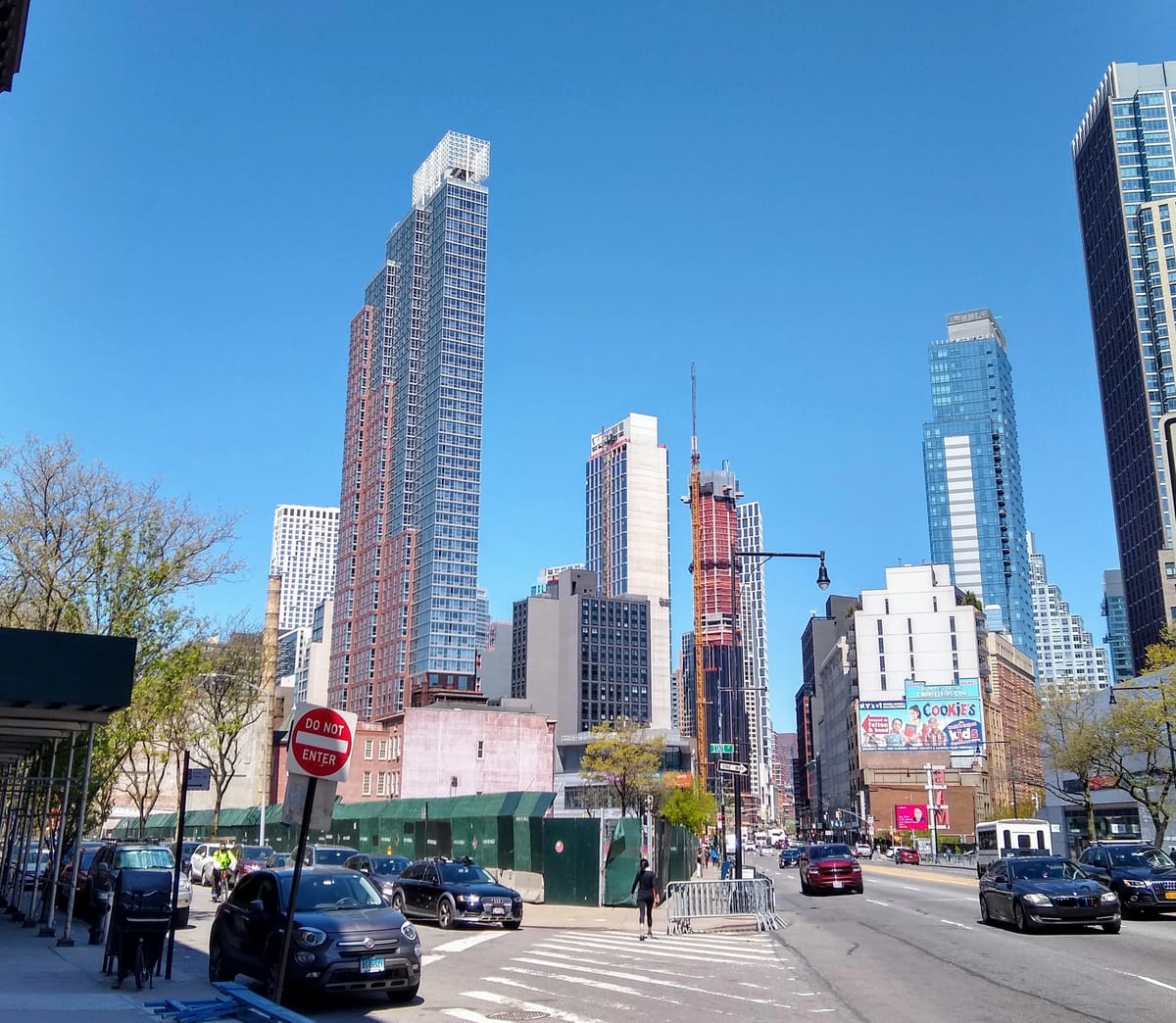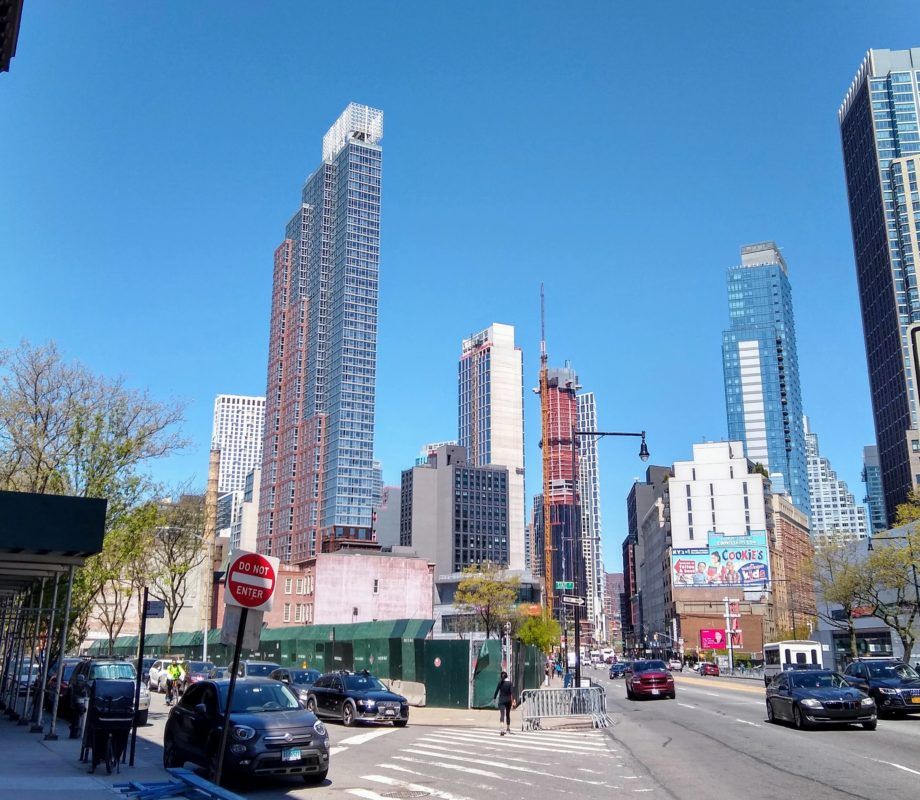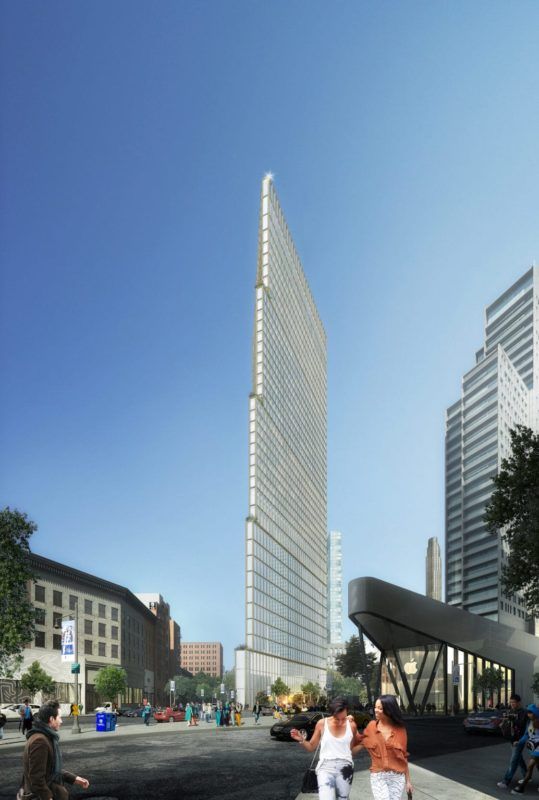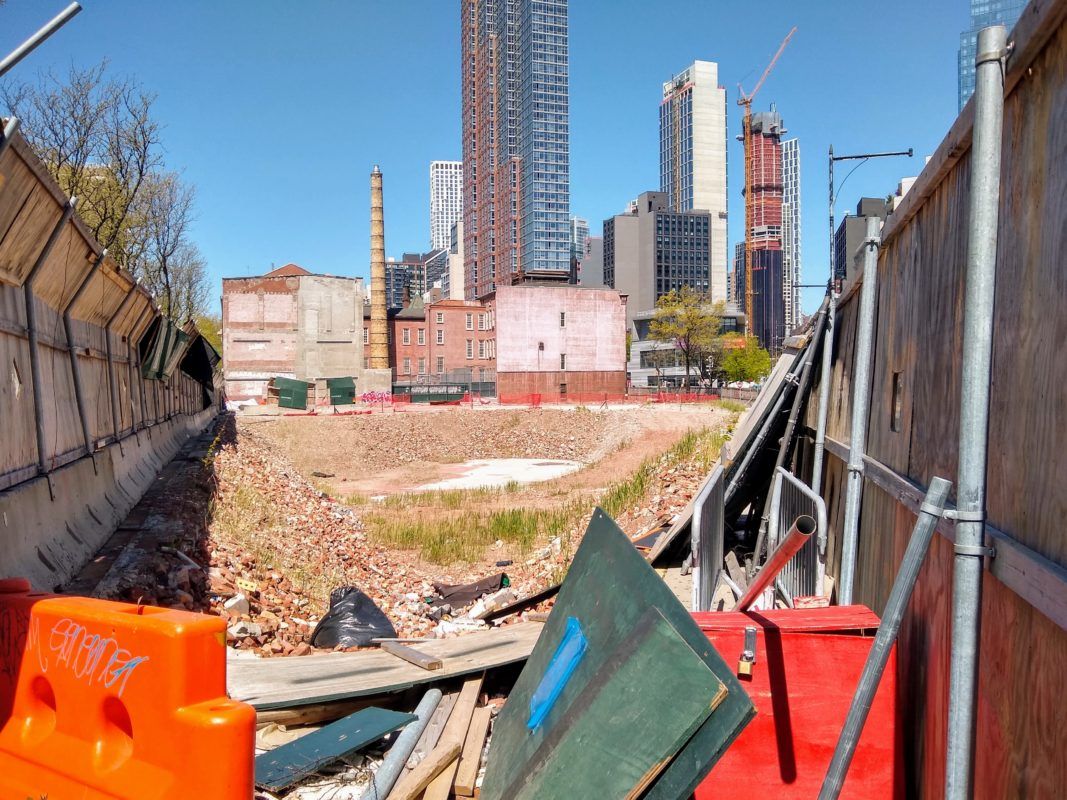80 Flatbush Project Swaps Office Space for Mostly Market-Rate Housing in First Tower As It Begins Construction


The 80 Flatbush project, in Downtown Brooklyn at the edge of Boerum Hill, is set to finally start construction on the first phase of the project, a 44-story, 480-foot tower. Thanks to the post-pandemic realities, it will be different from what was presented to the City Council in September 2018.
Questions remain about when the affordable housing component of the project, its main selling piece, will be fully delivered, whether there are any meaningful penalties associated with ensuring timely delivery, and what they may be.
Alloy Development proposed the project as a mix of market-rate and affordable rentals, office space as well as two new schools, and cultural space on a trapezoidal site bounded by Flatbush and Third avenues, and Schermerhorn and State streets.
The project was to be developed in two phases. The first phase would contain a flatiron-shaped tower at Flatbush Avenue and State Street, home to market-rate units and office space, as well as the schools. Phase two would involve a larger tower extending from a more cubic base, stretching some 840 feet, which would contain market-rate and affordable housing units.
Originally, the first phase was projected to be finished in 2022 and the second phase by 2025, but the schedule slipped. By December 2019, when Alloy announced plans for the first tower, an all-electric building (a first) designated 100 Flatbush, construction was expected to begin in the spring of 2020 and be complete by 2023.
The larger second tower, then projected to contain some 640 of the project’s nearly 900 apartments, including all 200 permanently affordable ones, was then projected to be completed by 2026.
The below-market units will be for low-income households at an average of 60% of Area Median Income (AMI). Income limits as of 2021 are $50,160 for a single person and $71,580 for a family of four.
Pandemic changes plans
Then came the pandemic, which not only delayed construction but also upended the market for office space, changing Alloy’s plans.
The developer decided to swap some 100,000 square feet of office space for housing, increasing the total from 257 apartments to 441 apartments, as stated in the Department of Buildings filings. Alloy says 45 of the apartments—about 10%—would be affordable, though no affordable units were required in the first tower.

“The financing market for speculative commercial office space has been very challenging,” Alloy spokesman James Yolles told Bklyner. “Given this context, we decided to rebalance the program between the phases.”
The approved zoning allows flexibility regarding the amount of residential and office space, and the allocation between the phases, he said, noting that Alloy aims for “a late spring/early summer” construction start.
“We think this is all coming at a critical moment as the city works to recover from the pandemic, said Yolles, citing 700 school seats, affordable housing, schools built to Passive House low-energy standards, and hundreds of jobs. The new elementary school will have 350 seats, while Khalil Gibran’s capacity will increase from 300 to 350 students in the new building.
The first phase is projected by the developer to be completed in the first half of 2024. The second phase will start at an unspecified time after that and should take three years.
Implications of Delay on Affordable Housing
Michelle de la Uz, executive director of the Fifth Avenue Committee (FAC), Alloy’s affordable housing partner, told Bklyner that she’s aware of the changes and is glad that some affordable housing has been advanced to the first phase.
The delivery of 45 affordable apartments by 2024, just under a quarter of what the project is to develop, may help make up for the fact that the rest of the affordable units will now be delayed by at least 2 years – until 2027. If Area Median Income, based on regional statistics, continues to rise, the delay makes the housing less affordable to city residents.
“Critically, this project addresses fair housing needs by creating truly and permanently affordable housing in one of the wealthiest parts of Brooklyn—something we’re sorely lacking—and we’re excited to be getting started soon,” said de la Uz, referencing the city’s focus on fair housing goals.

“We’re fully confident that the affordable housing will be delivered as required by zoning and as approved through ULURP in 2018,” she added.
Zoning requires that 20% of the residential floor area overall must go to affordable units.
Timing, Delays, and Enforceability
Questions remain as to when Phase 2 launches and what that tower contains.
“Market conditions at the time of Phase 2 will determine the Phase 2 mix of uses,” Yolles said. “No additional approvals will be required.”
Phase 2 cannot be started before Phase 1 is complete, as it includes land currently occupied by Khalil Gibran Academy, which will get a new school in the building developed during Phase 1.
A portion of the Phase 1 tower that will become the schools will be owned by ECF, the Educational Construction Fund of the New York City Department of Education, which partners with developers on mixed-used projects that include new schools. The portion owned by ECF will be leased to Alloy, and revenues from that portion will cover debt service on the school construction bonds, Yolles explained.
After the completion of Phase 1, ECF will transfer the publicly owned land to allow for Phase 2 development.
ECF can charge penalties, which are designed to ensure the timely delivery of projects.
“They kick in if Alloy is delayed beginning Phase 2 after ECF conveys it the Phase 2 land, which occurs at the completion of Phase 1,” Yolles said.
The Mystery of The Penalties
What exactly are those penalties regarding delays?
Alloy declined to comment. De la Uz stated that the issue is “not something that FAC can comment on.” ECF and Council Member Steve Levin also did not respond to Bklyner’s questions.
De la Uz did note a significant incentive – once the Phase 2 building starts, it can’t obtain its final Certificate of Occupancy without the Mandatory Inclusionary Housing (MIH) units “being fully rented up, which is a significant incentive to finalize and rent up the MIH units. That is a key enforcement piece the City has put in place.”
But transparency regarding a delayed start remains lacking. Aiming to learn more about such penalties, this journalist on Oct. 16, 2018, filed a Freedom of Information Law (FOIL) request with the Mayor’s Office and another with the Department of Education, which was referred to the Educational Construction Fund. None have provided responsive documents.
A similarly large development nearby could serve as an indirect benchmark. A coalition of Brooklyn neighborhood groups negotiated the penalty for the Atlantic Yards project in 2014, after threats of a fair-housing lawsuit. The developer has to pay the city $2,000 per month for every affordable unit in the project, since renamed Pacific Park, which is not delivered by May 31, 2025.




